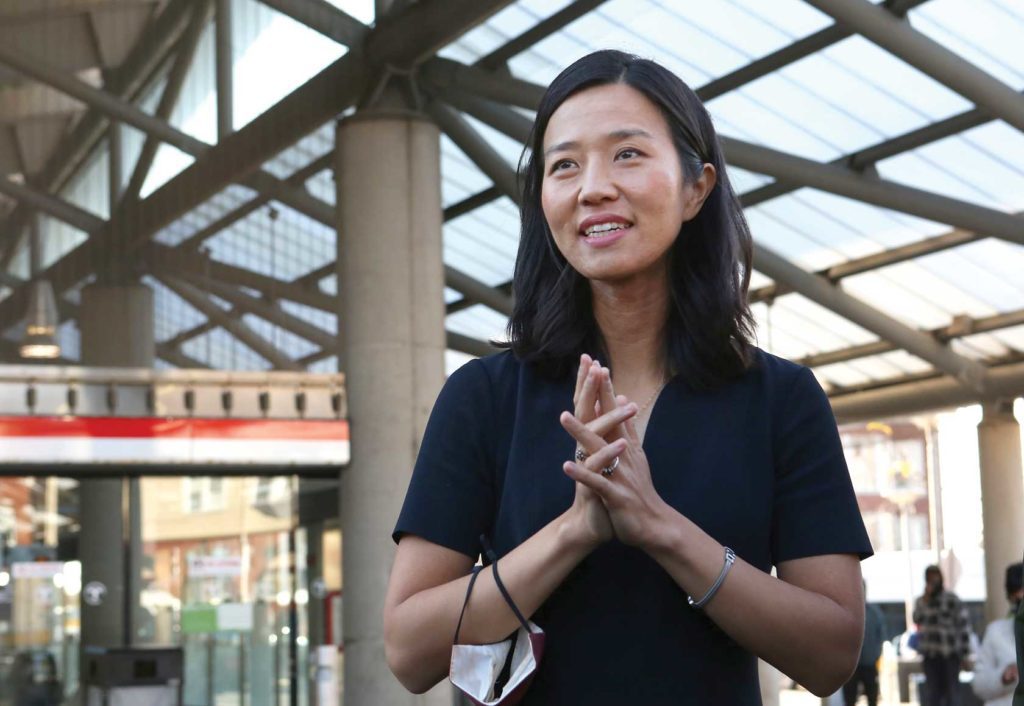
In her first full day in office, newly elected Mayor Michelle Wu requested the City Council appropriate $8 million in federal coronavirus relief funding to eliminate fares on three city bus lines for a two-year period.
Wu’s plan will make the 23, 28 and 29 bus lines free starting early next year. The program is an extension and expansion of the four-month fare-free 28 bus pilot program started under acting Mayor Kim Janey’s leadership.
“I am excited to take this key step towards a brighter transit future. Building on the fare-free 28 bus pilot created by Mayor Janey, we will expand access to transit across our neighborhoods, connecting more people to their schools, places of worship, small businesses, and community centers — and easing congestion on our bus riders and drivers alike. With stronger ties between our communities, we’ll reshape the boundaries of what’s possible in our city,” Wu said in a statement.
Wu has pointed to the success of the pilot as justification for the expansion, touting the increase in ridership in past months. According to the transportation advocacy group TransitMatters, which analyzed MBTA data, while overall bus and subway ridership stands at just over half of pre-pandemic weekday ridership levels, the free 28 bus saw ridership rise to 92% of pre-pandemic levels.
The chosen routes, which run through Roxbury, Mattapan and Dorchester and all intersect with Blue Hill Avenue, include the 23, which goes from Ashmont Station to Ruggles Station, the 28 going from Mattapan Square up Blue Hill Ave to Nubian Square and Ruggles, and the 29 from Mattapan Square up Blue Hill Ave to Jackson Square. The 29 route is also slated for a center bus lane as part of an infrastructure project announced last month.
During its Nov. 17 meeting, the City Council debated the measure. Several councilors spoke in favor of passing the measure immediately, including Councilor Michael Flaherty, chair of the city’s COVID-19 recovery committee.
“This two-year investment will allow the city to measure the benefits of fare-free service, such as the increased ridership, faster buses and less traffic, as well as business district development along the route,” Flaherty told his colleagues.
He added that “it’s consistent with the same broad goals” of the American Rescue Plan Act (ARPA) funds from which the mayor’s plan would draw. Flaherty told the Council that those goals include “supporting immediate economic stabilization for households and businesses and addressing systemic public health and economic challenges that have contributed to the unequal impact of pandemic on certain populations.”
He asked that council consider fast-tracking the measure to be passed that day. Councilors Kenzie Bok and Lydia Edwards also voiced support for doing so.
“I think it’s important for people to see that government can be responsive when voices are raised,” Bok said. “The citizens of Boston are saying loud and clear that they want public transit to be something that we invest in, that we celebrate, that we drive leadership on. That has come through clearly in the election.”
Edwards added that there was a sense of urgency in getting the measure passed, as public criticism continues over lawmakers’ slow pace in spending funds granted by the federal government in March.
“I think that so much of this post recovery is about how people move, and we did see that these particular communities and these particular bus lines are vital to parts of our city being able to be connected to all sorts of things,” she said. “This is not a permanent program we’re thinking about. This is a continuation of the pilot program that funds free buses and we’re picking specific geographic areas, honestly, to learn.”
However, no action will be taken just yet. Councilor Andrea Campbell, whose district includes parts of all three bus lines, opposed the hasty passage over budgetary concerns. The councilor pointed out at Wednesday’s meeting that the last pilot program, albeit successful in boosting ridership, was “overpaid” for. This is a claim that Mayor Wu admitted during one of the mayoral debates against Councilor Annissa Essaibi George.
“I’m happy that these particular lines were picked — most of them are in my district,” Campbell said. “During the course of some of the conversations related to the campaign, it was made clear that our previous mayor overpaid for the 28 … I do think that we need to have a conversation about [that]. How much more did the city invest in this than they needed to, to get this done?”
Campbell added that she would like to see the community be given an opportunity to weigh in.
The soonest a hearing could take place is this week. With no council meeting the week of the Thanksgiving holiday, the Council won’t pass any legislation until at least Dec. 1.
At a press conference in front of Ashmont station Thursday morning, Wu defended the original pilot’s budget of $500,000 saying, “The 28 bus wasn’t an overestimate, because it ended up that the city got an extra month to make up for that afterwards,” and that for the expansion, “the numbers are based off ridership figures and a calculation of fare replacement.”
“We have set aside this amount of funding based on the ridership numbers and the best estimates for how the 28 bus pilot has worked, and the increase in ridership that has come from that,” Wu said. She told the crowd gathered, with fingers crossed, that she is hopeful the City Council will be able to pass the plan soon.







